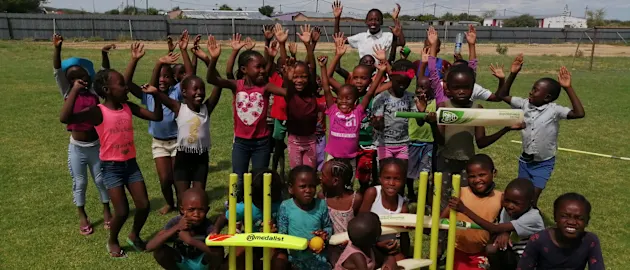Social and Development Initiative awards taken home by African winners


For over a decade, north-eastern Nigeria has seen a spate of insurgence from Islamic extremist group, Boko Haram.
As of the end of 2020, the UN's estimates suggest 350,00 people lost their lives as a result of Boko Haram's violent campaigns during the period, with countless more displaced in the country. Residing in Internally Displaced Persons (IDP) camps, many of whom have escaped the organisation live as refugees, trying to forge ahead with their lives in spite of the turmoil.
To provide support, particularly in the school system and through the Promoting Ethics Through Sports (PETS) Foundation, the Nigeria Cricket Federation launched their Special Intervention Programme.
Dev Awards: Cricket4Good Social Impact Initiative Of The Year – Nigeria
"A programme that came out of necessity", according to Nigeria Cricket Federation General Manager Emeka Igwilo, coaches are deployed to teach the game of cricket while also providing humanitarian aid and services, with the support helping 2,000 boys and girls and over 5,000 indirect participants.
"Nigeria woke up and the issue of insurgence started being a very huge problem from the north-east, particularly in Borno state, witnessing displacement of families. Displacement of parents of children, displacements of entire communities," Igwilo added.
"So for a long time the idea was, 'How can we be part of this? How can we change lives? How can we be part of the solution to getting these people, who are in a very tight situation?'"
Igwilo says the introduction of cricket, on top of the aid, brought purpose to people's lives among other marked changes faster than expected. "Part of what we do is that apart from teaching the game, we also support them with some items, food items, to also help them feel happy.
"We discovered when we introduced the game of cricket. The game changes the life of the players. The game changes the life of the students. We tried it in one school. And we got word that the school started seeing that cricketers came to be the leaders of the school.
"The game has a way of changing life."
With the south of the country becoming a new home for those displaced from the north and north-east, many young Nigerians had to form new relationships to fit in again.
Nigeria Cricket Federation Head of Media and Public Relations Musa Ehizoje has been on the ground helping at IDP camps, and says the lessons and friendships that come through the programme are necessary to move back into a "new life."
"They may never be able to return back to their homes," says Ehizoje. "But wherever they are, they can get a sense of belonging. Playing cricket and can actually forge a genuine career pathway into the mainstream of events.”
Top five moments from 1996 World Cup | ICC Men's CWC
Relive the top five moments from 1996 World Cup | ICC Men's Cricket World Cup
For many, the programme is seen as a "second chance at life." NCF estimate that 250,000 entrants will be positively impacted by the initiative in some way or another, and Ehizoje believes the three key pillars of cricket perpetuate positive change.
"We use cricket as an avenue to reach out to these people and tell them, one: this is what the game is all about. Two: why you're playing this game - we try to make sure you and your life do not just 'exist'. Three: we'll try to make sure that you forge a career pathway playing cricket so that in the near future or sometime in the future, you have a few successful people from the programme. They can come back and give to the system from which they came out from."
As a side effect, the programme has also seen teams form within the camps in Edo State, that now pit themselves against other boys and girls school teams in various competitions. The NCF aims to replicate the trend in different camps across the country, and believes future national team players will come from the initiative.
Dev Awards: Digital Fan Engagement Of The Year – Estonia
Though no matter the students' pursuits, whether they be sporting or academic, Ehizoje has a strong overall vision for the programmes' future, and believes the programme will benefit from the wisdom imparted by its descendants.
"If you have five people who eventually play for Nigeria or for the states, you can come back as inspiration to those who are still living in the camp, and if they go out to become doctors, lawyers, then they can come back and give to this society.
"But we want to make sure cricket is the vehicle with which we are trying to achieve that. And that is the entire purpose. We can never take away the effect of Boko Haram in their lives. We will never be able to do that. But at least we can create a direction for a future that we can follow, for a decent life after Boko Haram."
Despite the effects and logistical hurdles that came with Covid-19 complications, Namibia pressed on with the Ashburton Kwata Mini-Cricket Programme, emerging with a 71% growth across the country in a remarkable show of resilience.
Originally designed to run during Physical Education lessons across the country, the closure of schools across the country threatened to quash the programme entirely, as the country came to a standstill.
Instead of lying down, Cricket Namibia instead looked at alternatives. Running sessions on vacant land, and on quiet streets and beaches, the programme continued.
The initiative grew from 12 to 14 regions across the country, with participation numbers growing from 39,000 to 67,000 participants, a remarkable figure given the programme of primary school children in a nation of 2.5 million people.
Dev Awards: Development Initiative Of The Year – Namibia
"One thing that you will realize with Namibia, it's all about the community," CEO of Cricket Namibia Johan Muller admitted.
"It's really people standing together and contributing what they can to make it work."
Able to roam around the country to deliver the lessons, but without the time constraints of school periods, the programme could cater for any budding cricketer interested, with pick-up games running well into summer afternoons.
"We literally ran the program for any single child that was interested. Our coaches went into different sections of towns every day, every afternoon, and they would volunteer, just start a cricket match and the kids would just start coming, until they stopped playing in the streets. That was the success of the program – that we were able to adapt. We were able to change what we normally did.
"But the credit must go to the many great coaches who lose out. They're the ones who are running the cricket programs within their respective communities. Also the volunteers who help out in the afternoons."
Ben Shikongo and Arrasta Diergaardt are just two of several national team players to once come through the system, and with the game's expansion into all areas of the country, Muller says the governing body is committed to continuing to grow even further.
"We are now in more than 22 towns within Namibia. We've got active coaches on a payroll that is running unique cricket programs consistently."


